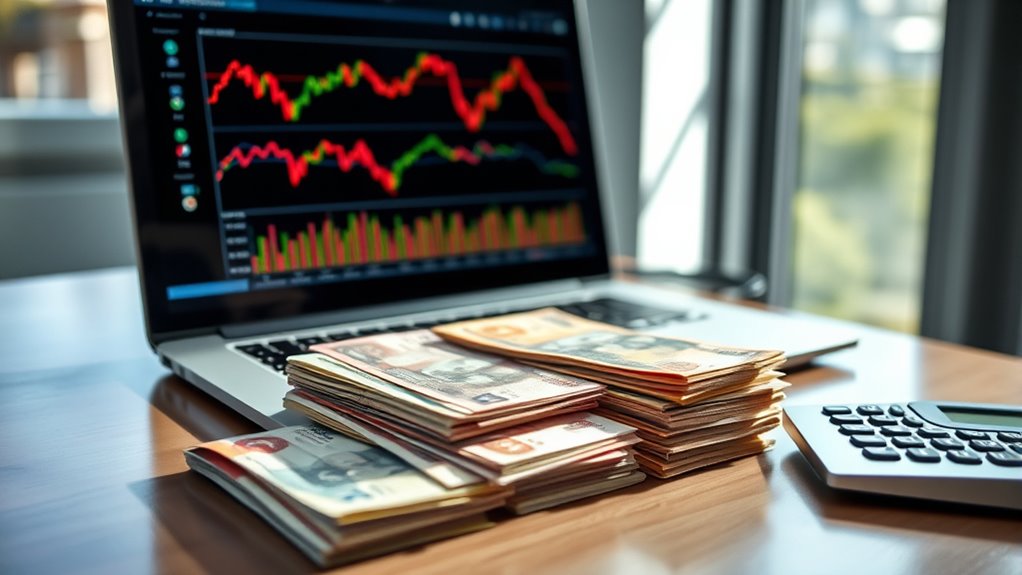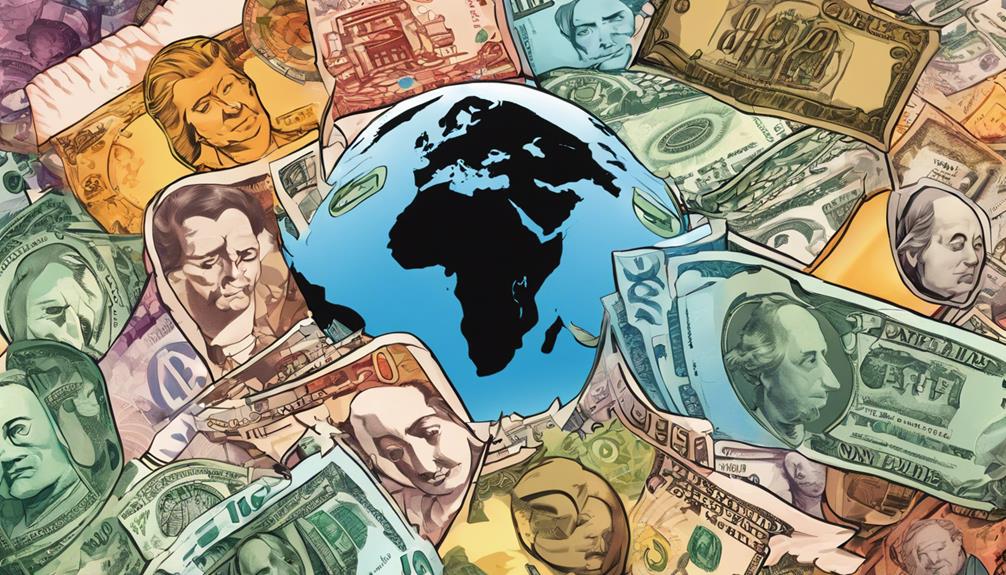Exchange rates influence your savings and investments by affecting how much foreign currencies, assets, and investments in other currencies are worth in your local money. When your currency weakens, the value of your foreign savings drops, while a stronger currency boosts their worth. Fluctuations can also impact your investment returns, increasing risk. Using strategies like currency hedging and diversification helps protect your assets. Keep exploring to learn how to better navigate currency changes and safeguard your financial future.
Key Takeaways
- Fluctuating exchange rates can increase or decrease the value of foreign savings and investments.
- Currency volatility may erode returns or create gains when converting assets back to your home currency.
- Hedging strategies protect investments from adverse currency movements and reduce risk exposure.
- Stronger foreign currencies enhance the worth of overseas investments, while weaker ones diminish it.
- Monitoring exchange rate trends helps investors time conversions and optimize the value of their savings.
Understanding How Exchange Rates Are Determined

Understanding how exchange rates are determined can seem complex, but at its core, it involves the interaction of supply and demand for different currencies. Governments influence this through exchange rate policies, which can be fixed, floating, or managed. These policies help stabilize or control currency values based on economic goals. Additionally, countries hold currency reserves—large amounts of foreign currencies and gold—that they use to influence their exchange rates. If a nation’s currency weakens too much, they might buy their own currency using reserves to shore up its value. Conversely, selling reserves can weaken a currency intentionally. Your country’s exchange rate is ultimately shaped by these policies, reserves, and market forces, making the process dynamic and responsive to both economic conditions and government interventions.
The Impact of Currency Fluctuations on Foreign Savings

When currency values fluctuate, they directly affect the value of your foreign savings. If the local currency weakens against your home currency, your savings lose value, especially if held in foreign accounts or assets. Conversely, a strong foreign currency boosts your savings’ worth. Geopolitical risks and crypto inflation can intensify these fluctuations, making your savings unpredictable. For example, political instability may cause sudden devaluations, while crypto inflation can erode savings stored in digital assets. To manage this, diversify your holdings and stay aware of currency trends. It’s also important to understand how contrast ratio impacts your home cinema setup, as it can influence your overall viewing experience during times of economic uncertainty. Here’s a quick snapshot:
| Situation | Impact on Savings | Recommended Action |
|---|---|---|
| Currency drops sharply | Loss in foreign savings value | Hedge with options or diversify |
| Crypto inflation spikes | Digital assets lose value | Balance with traditional savings |
| Geopolitical risks | Sudden currency devaluation | Stay informed & adjust holdings |
| Currency appreciates | Increased foreign savings value | Rebalance portfolio accordingly |
Effects of Exchange Rate Movements on International Investments

Exchange rate movements can considerably impact your international investments, influencing their returns and overall value. When currencies fluctuate, your investments may gain or lose value unexpectedly. For example, savvy investors use currency arbitrage to exploit small differences in exchange rates across markets, boosting profits. Accurate exchange rate forecasting helps you plan and avoid losses caused by sudden shifts. Consider these effects:
Exchange rate fluctuations can unexpectedly impact your international investment returns.
- Currency fluctuations can erode or enhance investment returns.
- Exchange rate volatility increases investment risk.
- Currency arbitrage opportunities may arise during rapid movements.
- Poor forecasting can lead to misaligned investment timing.
- Long-term investments are affected by sustained currency trends.
- Staying aware of market dynamics helps you adapt to changing currency conditions. Additionally, understanding interest rate differentials between countries can give you insights into potential currency movements, enabling better strategic decisions. Recognizing exchange rate trends and their impact on investments is essential for maintaining a balanced portfolio, especially during unpredictable market periods. Staying informed about exchange rate trends allows you to make smarter decisions and navigate international markets more effectively.
Strategies to Protect Your Assets From Currency Volatility

To protect your assets from currency volatility, adopting proactive strategies is essential. Currency hedging is a key tool, allowing you to lock in exchange rates and reduce exposure to sudden fluctuations. Using financial instruments like forward contracts or options can shield your investments from adverse currency movements. Additionally, diversification strategies play a crucial role; spreading your assets across multiple currencies and geographic regions minimizes risk. By not relying on a single currency or market, you lessen the impact of currency swings on your overall portfolio. Incorporating self-awareness into your financial planning can help you better understand your risk tolerance and investment preferences. Engaging with wall organization systems can also help you keep track of your diversified assets and monitor market changes more effectively. Staying informed about emerging AI security innovations can provide a competitive edge in managing financial risks and safeguarding your investments. Participating in remote hackathons or similar collaborative platforms can provide insights into emerging financial technologies and innovative risk management tools. Combining currency hedging with diversification helps create a more resilient investment plan, safeguarding your savings against unpredictable exchange rate shifts. Implementing these strategies ensures your assets stay protected, regardless of currency market volatility. Additionally, understanding how exchange rates fluctuate can help you make more informed decisions in your investment approach.
Monitoring and Responding to Exchange Rate Changes

Keeping a close eye on currency movements is vital once you’ve implemented hedging and diversification strategies. Staying informed about exchange rate forecasts helps you anticipate potential shifts that could impact your savings and investments. Regularly monitor financial news, currency markets, and economic indicators to identify trends. Adjust your currency hedging strategies if forecasts indicate a significant change, protecting your assets from adverse fluctuations. Be aware of large numerical units such as crores, millions, and billions, as understanding these conversions can aid in better interpreting market data and financial reports. Understanding financial market trends can help you make more informed decisions about your currency exposure. Additionally, understanding how Bitcoin IRA strategies respond to market fluctuations can provide valuable context for your investments. Consider these actions:
- Track currency pairs relevant to your holdings
- Evaluate the accuracy of exchange rate forecasts frequently
- Reassess your hedging positions based on market movements
- Stay updated on geopolitical events influencing rates
- Use financial tools or alerts to notify you of major currency shifts
Being aware of exchange rate volatility can further help you manage risks associated with currency fluctuations effectively. Recognizing the impact of currency fluctuations on your portfolio allows for better timing and strategic adjustments in your investment approach.
Frequently Asked Questions
How Do Exchange Rates Influence Global Economic Stability?
You might not realize it, but exchange rates play a big role in global economic stability. When rates fluctuate, they impact foreign aid and trade deficits, influencing countries’ economies. A strong currency can reduce the cost of imports, but hurt exports, leading to trade imbalances. Conversely, unstable rates can cause uncertainty, affecting international investments and economic growth. So, exchange rates are vital in maintaining a balanced and stable global economy.
Can Currency Hedging Guarantee Protection Against Exchange Rate Risks?
Did you know that over 80% of multinational companies use currency hedging strategies? While financial derivatives and hedging strategies can reduce exchange rate risks, they can’t guarantee complete protection. Markets are unpredictable, and unexpected fluctuations can still impact your investments. Hedging helps manage risks, but it’s not foolproof. Always assess your risk tolerance and consult with a financial advisor to craft a tailored approach.
What Role Do Central Banks Play in Currency Value Fluctuations?
Central banks influence currency value fluctuations primarily through monetary policy and managing currency reserves. When they adjust interest rates or buy and sell currencies, they can strengthen or weaken their national currency. By controlling these tools, they respond to economic conditions and stabilize the economy. As a result, the central bank’s actions directly impact exchange rates, affecting your savings and investments in ways you may notice through changing currency values.
How Do Political Events Impact Exchange Rates and Investments?
Political events are like storms on a calm sea, stirring up exchange rates and investments. When political instability or election outcomes create uncertainty, currencies can weaken or strengthen suddenly. You might see your savings lose value or investments fluctuate unpredictably. Staying informed about political developments helps you anticipate these shifts, so you can adjust your financial strategies accordingly and protect your assets from unpredictable currency swings.
Are There Tax Implications When Converting Foreign Currency Savings?
When you convert foreign currency savings, you may face tax implications like tax reporting and capital gains. If your conversion results in a profit, you might owe taxes on those gains. It’s important to track your exchange rates and document transactions accurately. Consult a tax professional to understand how capital gains apply to your situation, ensuring you comply with local tax laws and avoid potential penalties.
Conclusion
By understanding how exchange rates fluctuate, by staying aware of their impact on your savings and investments, and by adopting strategies to protect your assets, you can navigate currency volatility with confidence. Monitor exchange rate movements regularly, respond promptly to changes, and diversify your investments to minimize risks. Stay informed, stay proactive, and stay prepared—because in the world of currency, awareness and action are your best tools to safeguard your financial future.









